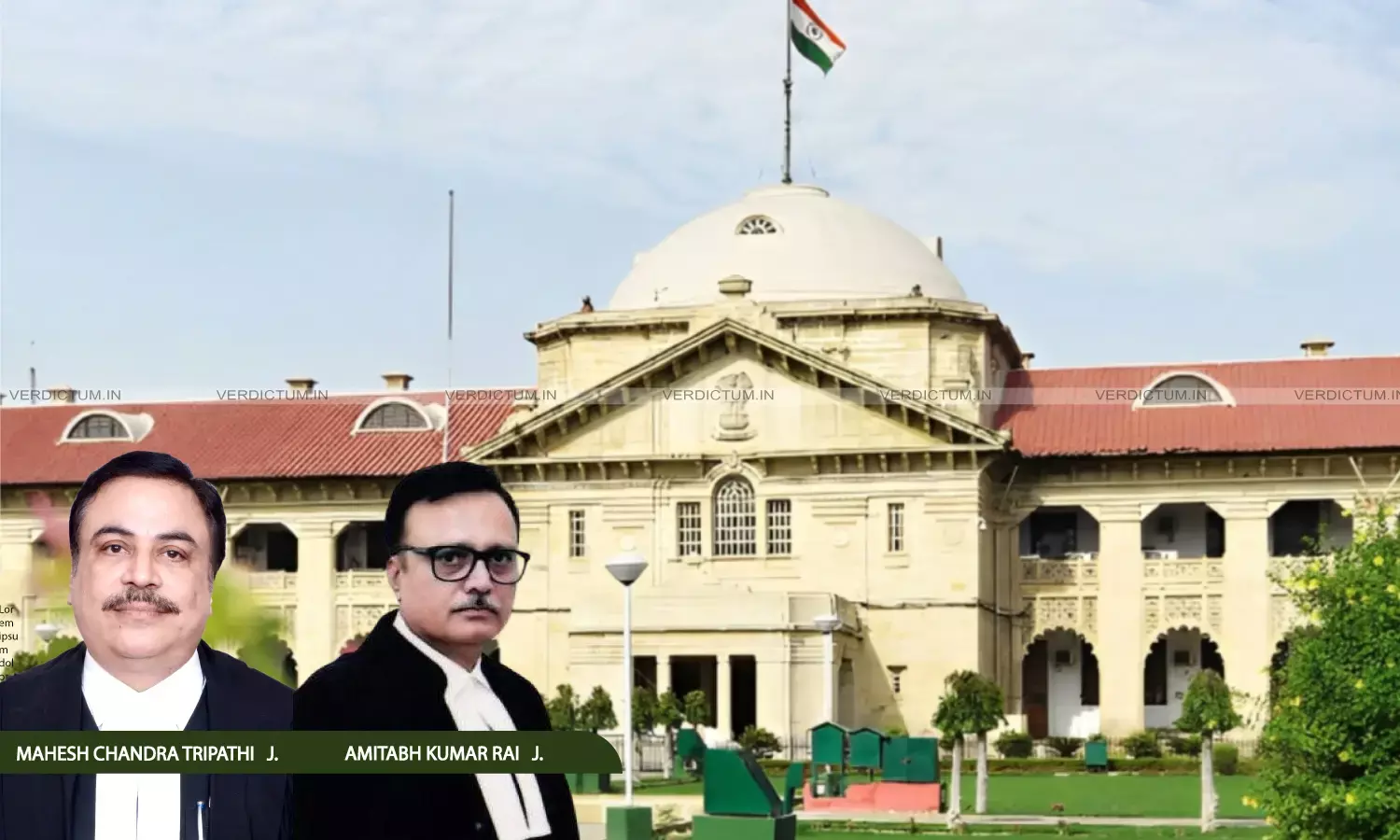Allahabad High Court: Limitation Period For Filing Applications U/S 28-A Land Acquisition Act Commences From Date Of Award On Which Applicant Relies For Determination
The Allahabad High Court remarked that the principle of distributive justice and equal treatment forms the very foundation upon which Section 28-A operates.

Justice Mahesh Chandra Tripathi, Justice Amitabh Kumar Rai, Allahabad High Court
The Allahabad High Court held that the limitation period for filing applications under Section 28-A of the Land Acquisition Act, 1894 (LA Act) commences from the date of the award on which the applicant relies for redetermination.
The Court held thus in a batch of Writ Petitions involving a common legal issue i.e., whether landowners who did not initially file references under Section 18 of the LA Act, can seek redetermination of compensation under Section 28-A based on enhanced awards granted to similarly situated landowners under the same acquisition notification.
A Division Bench of Justice Mahesh Chandra Tripathi and Justice Amitabh Kumar Rai observed, “Section 28-A of the Act, 1894 is a beneficent provision that must be interpreted liberally to achieve its object of removing inequality in compensation awards. … The limitation period for filing applications under Section 28-A commences from the date of the award on which the applicant relies for redetermination, not from any earlier award.”
The Bench remarked that the principle of distributive justice and equal treatment forms the very foundation upon which Section 28-A operates, ensuring that the economically disadvantaged and inarticulate sections of society are not deprived of their rightful compensation merely due to procedural constraints or lack of legal awareness.
Advocate Sudeep Harkauli appeared for the Petitioners, while Additional Chief Standing Counsel (ACSC) Devesh Vikram, Standing Counsel Fuzail Ahmad Ansari, and Advocate Suresh C. Dwivedi appeared for the Respondents.
Facts of the Case
The Writ Petition sought for a writ, order, or directions in the nature of mandamus directing the Krishi Utpadan Mandi Samiti (KUMS) to decide the representation of the Petitioners/landowners. It was further prayed that a direction in the nature of mandamus be issued to the KUMS to deposit the money mentioned in the letter and to comply with the Orders passed under Section 28-A of the LA Act. The Writ Petitions filed by KUMS sought a direction in the nature of certiorari to quash the order passed by the Special Land Acquisition Officer (SLAO). It was further prayer that a direction in the nature of mandamus be issued restraining the SLAO from compelling the KUMS to deposit the amount of compensation as re-determined.
The KUMS had made a proposal for acquiring 47.98 ½ acres of land for the purpose of construction of a Market Yard. Pursuant to such proposal, after making preliminary enquiries and preparing compensation statements, the State Government issued a notification under Section 4(1)/17(4) of LA Act and thereafter, a declaration under Section 6(1)/17 was issued. The possession of the acquired land was taken by KUMS and the award was declared. Being dissatisfied by the compensation, some of the tenure holders filed a Land Acquisition Reference, which was rejected. Pursuantly, Review Applications were filed, which were allowed and the compensation was enhanced. The KUMS challenged this and the case was remanded. After a round of litigations, the case was before the High Court.
Reasoning
The High Court after hearing the contentions of the counsel, noted, “The beneficent nature of Section 28-A of the Act, 1894 and the imperative of ensuring equal treatment to similarly situated landowners has also been reinforced by the Hon'ble Apex Court in Narendra and others vs. State of U.P. and others, wherein the Apex Court emphasized that the spirit underlying Section 28-A mandates that all landowners whose lands are acquired under the same notification should receive fair and equal compensation, regardless of technical limitations in their initial claims.”
The Court reiterated that once a particular rate of compensation is judicially determined as fair compensation, the benefit thereof should be extended even to those who could not approach the Court or who may have initially claimed lesser compensation due to poverty or other constraints.
“The Apex Court further emphasized that in matters of compulsory acquisition, landowners are not willing parties and are compelled to surrender their land for public purpose, making it imperative that they receive just and fair compensation without being penalized for technical deficiencies or their inability to claim higher amounts initially”, it added.
Coming to the facts of the case, the Court said that the landowners' applications filed were well within the prescribed limitation period of three months from the Reference Court's award.
“The SLAO's order dated 17.02.2022 granting enhanced compensation at Rs.108/- per square metre along with statutory benefits is legally sound and deserves implementation. … The KUMS' objections regarding limitation and maintainability lack merit and are contrary to established legal principles”, it observed.
Conclusion
Before parting, the Court noted with concern the prolonged litigation that denied the landowners their rightful compensation for over four decades.
“The wheels of justice, though they grind slowly, must ultimately ensure that justice is not only done but is seen to be done. The beneficial legislation like Section 28-A exists precisely to protect the rights of those who, due to various constraints, cannot initially assert their claims through formal legal processes”, it remarked.
In conclusion, the Court expressed the hope that the authorities will implement the Order in letter and spirit, ensuring that the landowners receive their due compensation without further delay or harassment and the compensation awarded is not a largesse but a legal entitlement that has been long overdue.
Accordingly, the High Court disposed of the Writ Petitions.
Cause Title- Ved Prakash Saini and 45 Others v. State of U.P. and 2 Others (Neutral Citation: 2025:AHC:169573-DB)


